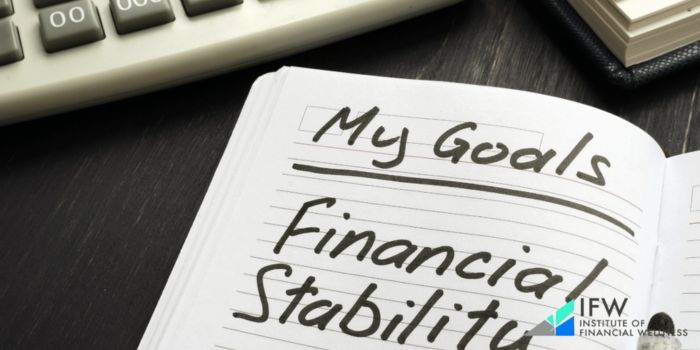“New Year = A New Life! Decide today who you will become, what you will give how you will live.” –Anthony Robbins
Think of your financial New Year’s resolutions as the personal trainer for your wallet—a dedicated coach turning your fiscal flab into toned, robust health. Each resolution is a step on the treadmill of financial fitness, propelling you towards the peak of monetary muscle.
These resolutions aren’t just lists on paper; they’re the keys to unlocking your financial potential and turning dreams into achievable plans. They’re your commitment to not just dreaming about financial freedom but actually living it. So, as you ring in the New Year, make a toast to your financial well-being – it’s time to shape up your finances and sculpt the future you deserve!
For those looking to secure financial stability, get ready because we will provide the necessary steps and strategies for making the most of your New Year financial goals. Taking a proactive approach in achieving these resolutions can have major positive repercussions when it comes to one’s overall fiscal health as well as peace of mind on their journey towards becoming financially free.
Key Takeaways
- Set realistic financial goals and commit to them
- Pay off high-interest debt & increase savings
- Create an investment plan tailored to your needs & explore side hustles for passive income
Set Realistic Financial Goals
“Being rich is having money; being wealthy is having time.” -Margaret Bonnano
Making realistic financial targets ought to zero in on significant territories, for example, taking care of obligations, boosting savings, and beginning an investment plan. By dedicating yourself to these fiscal resolves, you can make critical strides towards more secure budgetary future prospects.
It’s imperative that you organize these money-related destinations so as to achieve long-haul monetary stability and prosperity eventually.
Paying Off Debt
Utilizing techniques such as the avalanche or snowball technique can help prioritize the handling of high-interest debts, like those from credit cards. This will reduce their overall monetary burden and provide more money to be allocated towards different fiscal objectives, including increasing savings and investments.
Increasing Savings
Striving for a financial goal of saving at least 20% each month will make all the difference. An automated method would be placing part of your salary directly into a bank account that’s strictly used as savings, or you could open up higher-yield savings from an online banking option, which typically has greater interest rates than traditional banks. This can quickly raise the amount of funds stored and help you meet those monetary objectives more rapidly.
Starting an Investment Plan

Creating an investment strategy is a great way to expand your finances in the long term. Begin by deciding on what financial aims and risk appetite you have, then distribute funds into various asset categories such as stocks, bonds, and mutual funds.
Sticking with a disciplined approach while keeping sight of your fiscal objectives can set you up for achieving rewarding results from investing over time.
Adopt a Flexible Spending Strategy

“Beware of little expenses. A small leak will sink a great ship.” –Benjamin Franklin
The priority should be the essentials like bills and groceries. After that, one can direct any excess money based on individual needs and financial objectives.
Necessary Expenses
Maintaining financial security requires a mindful approach to prioritizing necessary costs. As much as 50% of your income should be allocated toward essential payments such as housing, transportation, groceries, and utilities. To repay any debt that might have been accrued. Establishing this secure foundation is paramount for effectively managing finances over the long term, and you can get budgeting apps to help you organize your income.
Allocating Remaining Funds
Having a secure financial life is key to obtaining your desired outcomes and ultimately gaining long-term economic freedom. After addressing necessary expenditures, it’s wise to budget 30% of available funds for discretionary uses while dedicating the rest towards settling debt or reserving savings.
Managing your personal finances with balance allows you to meet your fiscal objectives more effectively and enjoy greater monetary liberty in the years ahead.
Strengthen Your Emergency Fund

“If you want to be financially free, you need to become a different person than you are today and let go of whatever has held you back in the past.” -Robert Kiyosaki
Having a reliable financial contingency plan is invaluable, and it can be set up with an emergency fund to provide some security in times of need, such as if you become unemployed, incur healthcare costs, or have home repairs that must take place. Money market funds are recommended for the best results when building your safety net since they offer high yields compared to traditional savings accounts. Be sure not to get caught short-handed by providing enough coverage for regular bills during any unexpected situation.
High-Yield Savings Accounts
Opting for a high-yield savings account is an ideal way to help your emergency fund flourish. With their greater rates of return compared to conventional accounts, you can acquire more in terms of interest and increase the size of your backup finance faster.
Look around at what different banks offer with regard to fees and interest before choosing one that suits you best according to what you need from it most out of all the available options.
Living Expenses Coverage
Creating a financial safety net by saving 3-6 months of your living expenses in an emergency fund is highly advisable. It can give you the confidence that unexpected needs won’t cause undue stress since it’ll provide enough to cover everyday costs without having to rely on loans or credit cards. This extra source will grant security during tough times and ease any worry about covering basic necessities.
Enhance Retirement Savings

It is essential for your financial stability to secure your future by enhancing retirement savings. This can be done by making the most of employer-sponsored plans such as 401(k)s, diversifying investments, and staying dedicated in spite of volatile markets over a long period of growth.
401(k) Contributions
Make sure to take advantage of any employer matching contributions when contributing to your 401(k) plan, as this is a great way to boost retirement savings quickly. Don’t forget that there are other options available, such as individual retirement accounts (IRAs), which can also help you save for the future. When done right, these two approaches combined will ensure a healthy nest egg at retirement time and ultimately provide financial security during those golden years.
Diversifying Investments
By spreading out funds across a variety of asset classes, you are able to safeguard against risk and provide yourself with an even portfolio for future growth. Examples of these would be stocks, bonds, mutual funds, real estate holdings, commodities as well as cryptocurrencies.
Through this method, you can contain the impact that any individual investment has on overall savings while striving towards retirement targets – something achieved more easily through consistently monitoring what’s been invested in alongside keeping up with changes according to personal financial goals and willingness for risk-taking.
Boost Your Credit Score

Good credit can give you access to loan deals with low-interest rates and discounted car insurance premiums. In order to raise it up, staying on top of your credit report is key, as well as forming healthy financing habits. Regularly reviewing the data available in such a report should be part of an effective strategy for boosting one’s economic status over time by achieving superior scores on said document.
Credit Report Monitoring
According to the Fair Credit Reporting Act, everybody can access their reports from each of the three big bureaus free once every 12 months.
It’s important that you examine your document with extra attention in order to maintain good credit scores while disputing anything suspicious if needed.
Healthy Credit Habits
Maintaining a strong credit score and its accompanying financial advantages requires responsible habits. Paying all bills in full promptly is essential, as well as tackling high-interest debt payments quickly to limit the cost of borrowing. It’s advisable to limit new forms of credit inquiries where possible.
By implementing these practices consistently, you’ll be able to position yourself better financially for the future and enjoy the positive benefits that come with good management of your credit score!
Optimize Your Insurance Coverage

Evaluating life and disability coverage needs, as well as guaranteeing ample property protection, are essential steps of this process. Updating these plans on a regular basis will guarantee you have all the right safeguards in place. It’s very important that you optimize your insurance coverage for optimal security of both assets and loved ones alike!
Life and Disability Insurance
Aspects such as the ability of coverage to substitute income, provision for future financial support for family members, and the expense of buying a policy should all be taken into account when evaluating protection.
Decide between permanent or term insurance depending on what specific needs you have and the money-related ambitions that need achieving.
Property Insurance
To secure your financial future, it is essential to assess and update your property insurance policies on a regular basis. This will ensure you have sufficient coverage for the structure of your home, personal items owned by you, liability protection as well as additional living costs. Reviewing these policies can help protect all that you own and are responsible for in terms of assets.
Rebalance Your Investment Portfolio

Having a properly diversified and balanced investment portfolio is essential because you are securing gains from assets that have performed well while also adjusting the amount of risk within your financial situation according to what best fits with both personal goals and tolerance levels.
By periodically checking up on ETFs alongside other aspects of their finances, people can keep everything in alignment with those key factors, which will ensure they remain on track for achieving their desired outcomes.
Locking in Gains
Securing the profits earned on your investments is best achieved by locking in gains from any assets that have demonstrated high performance. You can accomplish this by offloading a portion or all of such holdings, which will enable you to capitalize on previously untapped benefits while simultaneously maintaining the asset allocation desired.
Exploring opportunities for diversification should be taken into account. Through investing in underperforming sectors, there may be potential growth available, and it would serve to broaden your portfolio’s range even more than before.
Risk Tolerance
Adopting an investment approach that best reflects your risk tolerance is key to creating a balanced portfolio. Financial objectives, time frames, and individual attitudes toward market fluctuations should all be taken into account when making decisions about investments.
Adapting your strategy so it adheres to the level of financial risk you are willing to take can help achieve maximum returns while minimizing potential losses in value associated with such risks.
Explore Side Hustles and Passive Income

Achieving your financial objectives can be made quicker by exploring side hustles and passive income options. These may include activities such as freelancing, possessing rental properties, taking part in affiliate marketing or selling products online, as well as investing in stocks/real estate. By branching out into various income streams, you create a more consistent and lasting monetary future for yourself.
Side Hustle Ideas
By engaging in side hustles such as freelance writing, tutoring, or pet sitting, you can create additional income streams. This will give you greater financial freedom and help you reach your money objectives more quickly by generating extra funds. It is also possible to make some cash from dog walking or selling items through an online marketplace – whatever works best for the individual’s current circumstances. All of these strategies enable debt repayment plans and savings goals to be achieved much faster due to increased earnings opportunities made available through a second stream of revenue.
Passive Income Opportunities
Exploring financial opportunities, such as dividend stocks, rental properties, and peer-to-peer lending, can help diversify income sources and reach your money targets more quickly. These passive options provide the potential for extra earnings with minimal effort, allowing you to concentrate on other interests or primary occupations.
By investing in these areas, it is possible to make progress towards achieving your desired goals without having a lot of labor involved in them.
Review and Update Estate Plans

It is essential to review and update estate plans in order to guarantee that assets will be distributed properly according to financial objectives. Estate planning entails documents such as wills, trusts, and power of attorney. Regular checks for these elements can preserve wealth while making sure that family members receive the care they deserve based on your wishes. Examining all components of an estate plan helps secure resources, so you achieve your fiscal aspirations successfully with contentment.
Estate Plan Components
Creating a well-thought-out estate plan requires several key parts, such as:
A will to make sure your assets are divided up following your wishes, trusts that can give additional tax advantages and shield property, plus power of attorney designations that grant an individual you trust the authority to handle monetary matters or medical decisions in case you become incapacitated.
Having all these elements ready safeguards not only those involved but also safeguards financial security for yourself.
Beneficiary Designations
It is important to review and adjust your beneficiary designations regularly as part of an effective estate plan since these dictate who will inherit particular assets such as bank accounts, life insurance policies, and retirement savings. This way, you ensure a hassle-free transfer of these valuable items to the right people. Keeping track of keywords like “life insurance”, “bank,” or “retirement accounts” should help make sure all bases are covered when it comes time for this transition process.
The Institute of Financial Wellness: Learn How to Make Your Financial New Year Resolutions Come True

The Institute of Financial Wellness provides individuals with the resources and guidance to reach their financial goals for the new year. This includes budgeting tips, investment strategies, setting achievable objectives, debt management assistance, and retirement planning advice tailored specifically to each individual’s unique situation. With this support in place, they can make informed decisions throughout the entire process – from establishing short-term resolutions to achieving long-lasting financial security.
By taking full advantage of these services offered by The Institute of Financial Wellness, people have a better chance at meeting all their money-related commitments set out during New Year’s Resolution season – leading them onto an even brighter future! Contact a financial advisor today!
Full Summary
Start your financial journey by formulating concrete New Year resolutions. By creating achievable goals, having a flexible spending plan, increasing emergency savings, building up retirement reserves and credit ratings as well as ensuring optimal insurance coverage for yourself can all lead to long-term financial security and freedom. Even looking into avenues like side hustles or passive income streams could be beneficial in reaching these objectives – so don’t wait any longer. Set yourself on the path of fiscal success now!
Frequently Asked Questions
How can I improve my finances in the new year?
As the new year begins, try to take charge of your finances; paying down debt and tracking spending are two great steps! Keep a budget in mind when you spend so that you’re not going over it. Another thing is making sure to save first before diving into any purchases. Don’t forget about reviewing credit reports, too, along with rebalancing your portfolio as necessary. All these easy techniques will go far in improving financial health throughout 2024.
How do I start all over financially?
Evaluate what you have, identify your top priorities, formulate a budget to manage it all better, take steps to pay off any debt as soon as possible, use automation methods for saving money more easily, and work on building up good credit, following these instructions can help bring back financial control into your life.
What are some effective methods to help you stay motivated while saving money?
Creating a savings account where some of your income can be placed and not touched is one way to stay motivated while setting aside money. Directly transferring funds into an inaccessible bank account or having it dispersed from each paycheck is another successful tactic for saving up.
What is the recommended amount to save in an emergency fund?
Building an emergency fund with 3 to 6 months of your living costs saved up is the smart way to guarantee a secure future. It’s vital that you start saving right away in order for this plan to be successful.




